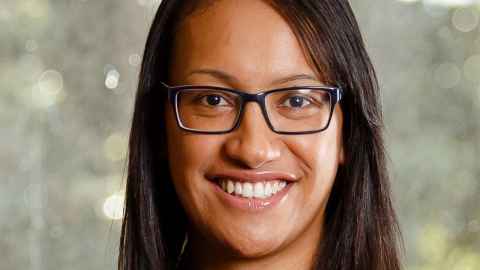Lupe Taumoepeau
Vascular Surgeon, Capital and Coast District Health Board.

Announcing at five years of age that you’re going to become a doctor when you’re older isn’t that unusual. But when Lupe Taumoepeau told her family at five that she would become a doctor, she was deadly serious. There was no Plan B.
One person who never doubted her ambition was her grandfather, Samiu Taumoepeau, who himself had been a successful eye surgeon in Tonga.
Not surprisingly, he would prove to be a big influence in Lupe’s life and her decision to follow in his footsteps to pursue a medical career.
Born in Auckland to a tight-knit Tongan family and the oldest of two girls (sister Nanise is a pathologist) her father, who came to New Zealand from the tiny village of Kolofo’ou in 1966, was an accountant while her mother worked in administration and aged care.
Lupe says growing up family and community were everything.
“There’s a strong service ethic in the Tongan community, to look after each other and put others first. It’s the way you are brought up from an early age. I saw medicine as a very strong application of these values.”
She attended Baradene College and became Head Girl. Lupe recalls a busy life playing touch rugby, netball, being part of a dragon boating crew as well as playing the piano, flute and violin.
“My mother put a big emphasis on us being well rounded and made sure we were always kept busy.”
Following through on her promise to study medicine and despite having high enough marks to gain admission under the general scheme, Lupe chose to apply under the Maori and Pasifika admission scheme (MAPAS).
Applying for the MAPAS scheme was about solidarity, says Lupe. “It was about identifying as a Pacific Island woman who wanted to study medicine and being supportive of others doing the same.”
After graduating, Lupe spent four years as a junior doctor at Waikato Hospital. Inspired by a female orthopaedic surgeon, she initially considered the idea of specialising in orthopaedics, or even plastic surgery. But working alongside three male vascular surgeons proved a turning point and, despite a lack of female role models, and stiff competition to get into the five-year vascular training programme (which takes only 11 doctors a year across Australasia), Lupe was the first female New Zealander accepted into the programme.
Lupe refers to vascular surgeons as the “plumbers of the human body”.
“The body needs blood vessels to get blood to and from various organs. We operate on blocked blood vessels all over the body; except for the heart and brain.”
But there is one particular aspect of her job Lupe finds particularly rewarding.
“Being involved in kidney transplants and offering patients with kidney failure such a life changing opportunity is immensely satisfying.”
However, dealing with both unconscious and conscious bias has been one particular learning Lupe says she could do without. Unfortunately it’s the reality of being New Zealand’s first female vascular surgeon and the only Pacific Island female vascular surgeon in Australasia.
“I’ve been mistaken for the cleaner or hospital orderly on multiple occasions and when I enter a patient’s room with a junior European colleague often the assumption is that my colleague is in charge. Previously I would bite my tongue, but with time, I have come to value who I am and my role and now realise that correcting people about mistaken identity is just stating a fact – No, I’m the surgeon!”
Sadly, Lupe says her grandfather passed away while she was at medical school and never got to see her graduate, but she will always be grateful for his guiding influence.
“As an eye surgeon in Tonga I spent many hours listening to his stories of surgery and loved to pore over his surgical textbooks when I visited during the holidays. I found it amazing you could change someone’s life for the better with your hands. Now I get to do that every time I go into surgery.”